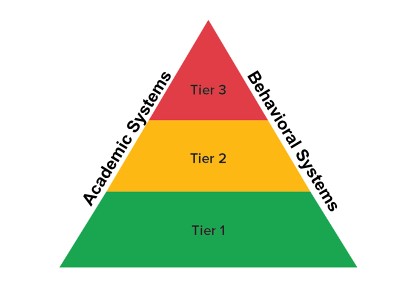Multi-Tiered Systems of Support (MTSS)

What is MTSS?
A Multi-Tiered System of Support (MTSS) is a process that provides high-quality, research-based instruction targeted to learner needs. Needs are identified by evaluating data and monitoring students’ progress. Adjustments to instruction and interventions are based on students’ performance and rate of success.
MTSS provides high-quality, standards-based instruction and intervention that is matched to students’ academic, social and behavioral needs. MTSS was previously referred to as Response to Intervention.
Key Principles of MTSS
Early intervention
Multi-tiered model of service delivery that provides a continuum of support (Tier 1, Tier 2, Tier 3)
Instruction matched learners’ needs
Progress monitoring data collected regularly to ensure effectiveness of instruction
Research-based interventions and instruction
Interventions implemented consistently and correctly
Parent involvement is encouraged throughout the child’s educational journey
Benefits of MTSS
Improved education for ALL students
Provides at-risk students with support earlier rather than later
Progress monitoring data yields relevant, easily understood information
Facilitates collaboration among educators, families and community-members
Key MTSS Terms
Tier I is core instruction for ALL students and should meet the needs of
approximately 80% of students
Tier II is aimed to provide a focused intervention for students who are not fully responding to core instruction. Up to 15% of students may require small group, supplemental instruction designed to supplement Tier I.
Tier III is the most intensive level of intervention. Approximately 5% of students may need this level of intensive individual or small group intervention typically delivered by a reading specialist, math specialist, or social worker.
Universal Screening: A procedure in which all students are given an academic screening assessment (Fastbridge or DESSA) three times per year for the purpose of identifying those students in need of specialized interventions.
Progress Monitoring: A practice used to frequently assess students’ academic progress to determine effectiveness of intervention.
What is the role of the parent/guardian in MTSS?
Parents play a critical role in supporting what their children are learning in school. Research has demonstrated that the more parents are involved in student learning, the higher the student achievement. Parents can be involved in the process by communicating any concerns to the child’s teacher, providing insight into their child’s learning and development, and assisting with identified interventions at home.
ADAPTED FROM BOZEMAN PUBLIC SCHOOLS “A PARENT’S GUIDE TO MTSS”
Additional Information:
Mokena School District receives federal funding through Title I, Part A of the Elementary and Secondary Education Act, as amended (ESEA). This grant provides financial assistance to districts to ensure all children meet challenging state academic standards. Title I funds are used to help provide intervention services to eligible students identified as the most at risk of not meeting the Illinois Learning Standards as determined through our MTSS procedures.
Intervention programs funded through Title I, Part A subscribe to the Mokena District and Parent Compact which provides a framework for educators and families to work together in shared responsibility to help improve a student's academic or behavioral performance.
The Mokena District and Parent Compact can be viewed through this linked document.
